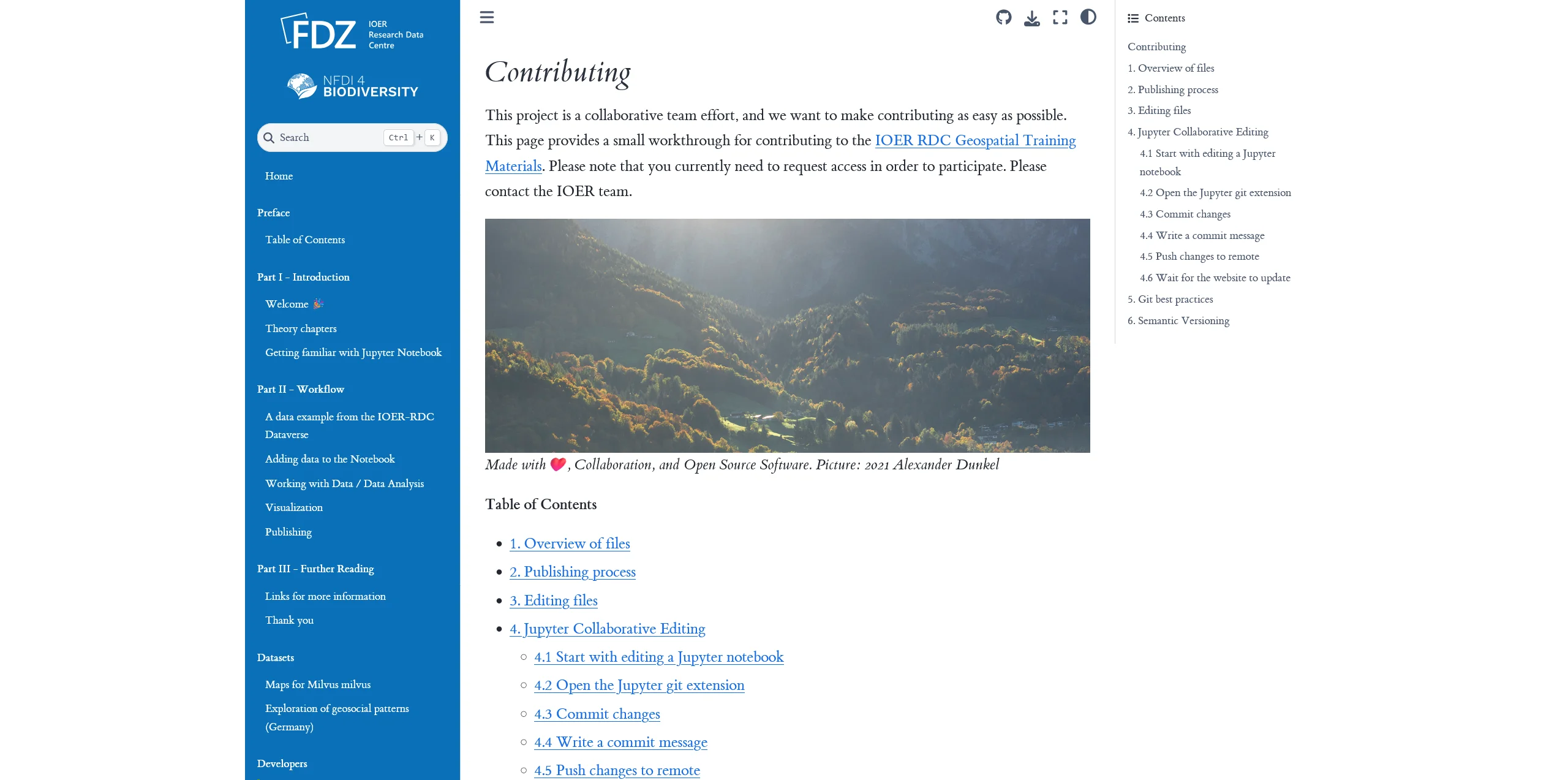Jupyter-Book Training Material
This project is currently internal only.
For publishing training materials for the IOER-RDC, together with NFDI4Biodiversity,
I created a Gitlab CI pipeline that produces HTML-materials from *.ipynb files. At the core of this process is jupyter-book,
which does most of the heavy lifting. As a starting point, I used the excellent Geographic Data Science with Python book from
Sergio Rey, Dani Arribas-Bel, & Levi Wolf.
The book is currently available internally at:
- https://stag.knowledge.fdz.ioer.info/ (testing)
- https://knowledge.fdz.ioer.info/ (production)

This is the Gitlab pipeline.
stages:
- build-staging
- build
- deploy
- deploy-staging
build-staging:
image: "registry.gitlab.vgiscience.org/tud_ifk/miniconda-cidefault:0.7.6"
stage: build
variables:
GIT_FETCH_EXTRA_FLAGS: --tags
GIT_STRATEGY: clone
before_script:
# initialize conda shell
- conda init bash
- source ~/.bashrc
# activate default ci_env from registry image
# contains anybadge
- conda activate ci_env
script:
# checkout to release branch
- git checkout -B "$CI_COMMIT_REF_NAME" "$CI_COMMIT_SHA"
# create staging badges with version from latest tag
- version_str=$(git describe --tags $(git rev-list --tags --max-count=1))
- version_var="$(echo $version_str | cut -c2-)-staging"
- echo "Version for badges $version_var"
- anybadge -l version --value="${version_var}" --file=version.svg --color=green
- anybadge -l pipeline --value="passed (staging)" --file=pipeline.svg --color=green
# convert readme to index.html and contributing.md and copy to webroot
# use intermediate step to include mermaid conversion
- npx -p @mermaid-js/mermaid-cli mmdc -p ./.pandoc/puppeteer-config.json -i README.md -o README.md
- npx -p @mermaid-js/mermaid-cli mmdc -p ./.pandoc/puppeteer-config.json -i CONTRIBUTING.md -o CONTRIBUTING.md
- pandoc -v
- pandoc --standalone --embed-resource -c .pandoc/readme.css --template .pandoc/readme.html -f gfm -t html README.md -o readme.html
- pandoc --standalone --embed-resource -c .pandoc/readme.css --template .pandoc/readme.html -f gfm -t html CONTRIBUTING.md -o contributing.html
# create book
- jupyter-book config sphinx .
- jupyter-book build .
# replace version badge with staging path
- sed -i -e 's|https://knowledge.fdz.ioer.info/version.svg|https://stag.knowledge.fdz.ioer.info/version.svg|g' _build/html/intro.html
# custom ugly fix for header style of "welcome" page (shown in red)
- sed -i -e 's|<h1>Welcome 🎉<a class="headerlink" href="#welcome" title="Permalink to this heading">#</a></h1>|<h1><span style="font-size:60px; font-weight:bold; color:red; font-family:"Comic Sans MS";">Welcome <span style="font-family:unset;">🎉</span></span><a class="headerlink" href="#welcome" title="Permalink to this heading">#</a></h1>|g' _build/html/notebooks/01_introduction.html
# collect artifacts
- mkdir ._site
- cp *.svg ._site
# copy book files
- cp -r _build/html/* ._site/.
- cp .pandoc/*.css ._site
- cp .pandoc/*.png ._site
- cp *.html ._site
- cp -r resources/* ._site
- mv ._site _site
artifacts:
name: _site
paths:
- _site
only:
- staging
build:
image: "registry.gitlab.vgiscience.org/tud_ifk/miniconda-cidefault:0.7.6"
stage: build
variables:
GIT_FETCH_EXTRA_FLAGS: --tags
GIT_STRATEGY: clone
before_script:
# initialize conda shell
- conda init bash
- source ~/.bashrc
# activate default ci_env from registry image
# contains anybadge
- conda activate ci_env
- conda install jupyter-book -c conda-forge
script:
# checkout to release branch
- git checkout -B "$CI_COMMIT_REF_NAME" "$CI_COMMIT_SHA"
- git config --global user.name "semantic-release (via GitlabCI)"
- git config --global user.email "semantic-release@gitlab"
# create release version
- url_host=`git remote get-url origin | sed -e "s/https:\/\/gitlab-ci-token:.*@//g"`
- git remote set-url origin "https://gitlab-ci-token:${GL_TOKEN}@${url_host}"
- semantic-release version
- semantic-release publish
- git push origin main --follow-tags
# create badges with version from latest tag
- version_str=$(git describe --tags $(git rev-list --tags --max-count=1))
- version_var=$(echo $version_str | cut -c2-)
- echo "Version for badges $version_var"
- anybadge -l version --value="${version_var}" --file=version.svg --color=green
- anybadge -l pipeline --value="passed" --file=pipeline.svg --color=green
# convert readme to index.html and contributing.md and copy to webroot
# use intermediate step to include mermaid conversion
- npx -p @mermaid-js/mermaid-cli mmdc -p ./.pandoc/puppeteer-config.json -i README.md -o README.md
- npx -p @mermaid-js/mermaid-cli mmdc -p ./.pandoc/puppeteer-config.json -i CONTRIBUTING.md -o CONTRIBUTING.md
- pandoc --standalone --embed-resource -c .pandoc/readme.css --template .pandoc/readme.html -f gfm -t html README.md -o readme.html
- pandoc --standalone --embed-resource -c .pandoc/readme.css --template .pandoc/readme.html -f gfm -t html CONTRIBUTING.md -o contributing.html
# create book
- jupyter-book config sphinx .
- jupyter-book build .
# custom ugly fix for header style of "welcome" page (shown in red)
- sed -i -e 's|<h1>Welcome 🎉<a class="headerlink" href="#welcome" title="Permalink to this heading">#</a></h1>|<h1><span style="font-size:60px; font-weight:bold; color:red; font-family:"Comic Sans MS";">Welcome <span style="font-family:unset;">🎉</span></span><a class="headerlink" href="#welcome" title="Permalink to this heading">#</a></h1>|g' _build/html/notebooks/01_introduction.html
# collect artifacts
- mkdir ._site
- cp *.svg ._site
# copy book files
- cp -r _build/html/* ._site/.
- cp .pandoc/*.css ._site
- cp .pandoc/*.png ._site
- cp *.html ._site
- cp -r resources/* ._site
- mv ._site _site
artifacts:
name: _site
paths:
- _site
only:
- main
deploy:
stage: deploy
image: "registry.gitlab.vgiscience.org/tud_ifk/rsync-ssh-alpine:alpine3.17-r0-v4"
before_script:
- eval $(ssh-agent -s)
- echo "${SSH_PRIVKEY}" | ssh-add -
- mkdir -p ~/.ssh
- '[[ -f /.dockerenv ]] && echo -e "Host *\n\tStrictHostKeyChecking no\n\n" > ~/.ssh/config'
script:
- rsync -avu -zz --no-perms --omit-dir-times --chown=www-data:www-data --chmod=D775,F664 _site/ "${PRODUCTION_DESTINATION}"/public/jupyter-book/
only:
- main
deploy-staging:
stage: deploy
image: "registry.gitlab.vgiscience.org/tud_ifk/rsync-ssh-alpine:alpine3.17-r0-v4"
before_script:
- eval $(ssh-agent -s)
- echo "${SSH_PRIVKEY}" | ssh-add -
- mkdir -p ~/.ssh
- '[[ -f /.dockerenv ]] && echo -e "Host *\n\tStrictHostKeyChecking no\n\n" > ~/.ssh/config'
script:
- rsync -avu -zz --no-perms --omit-dir-times --chown=www-data:www-data --chmod=D775,F664 _site/ "${PRODUCTION_DESTINATION}"/public/jupyter-book-staging/
only:
- staging